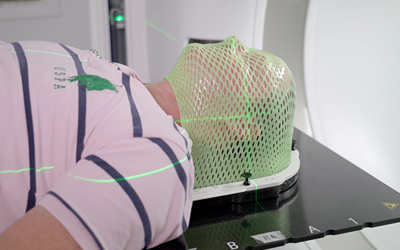
Tips for getting through treatment with a radiation therapy mask
At Icon, we use many different tests and scans to ensure our patients receive the best possible treatment for their cancer. For men with prostate cancer, one of the latest and most accurate tools used to detect the location of their cancer is the PSMA-PET scan.
A positron emission tomography (PET) scan is a nuclear medicine scan that tracks the uptake of a small amount of liquid radioactive material (also known as a tracer) in the body after it has been injected into the blood stream. Most PET scans use a type of radiolabelled sugar to detect the cancer, as the majority of cancers grow quickly and need sugar for that growth. The cancers show up as “bright” on the PET scan, providing additional information compared to a standard CT scan.
A/Prof David Pryor, Radiation Oncologist at Icon Greenslopes.
Be informed, feel empowered. Our free guide will help you make decisions about your, or your loved ones', care.

Unlike other cancers, prostate cancer generally grows slowly and often doesn’t show up on standard PET scans. For a PSMA-PET scan we use a different type of radioactive tracer that is targeted specifically at a protein present on most prostate cancer cells, called Prostate Specific Membrane Antigen or PSMA. A PSMA-PET scan can see small deposits of prostate cancer down to a few millimetres in size, so it is particularly good at detecting prostate cancer in the early stages when it first starts to spread.
The ProPSMA study showed that PSMA PET/CT is far more accurate than standard scans for high-risk prostate cancer, correctly staging 92% of cases compared to 65%. A recent Danish study also found that men whose cancer returned lived longer when this scan was used before radiation treatment.
An accurate assessment of whether, and where, the cancer has spread means that we can better tailor treatment to our patients’ individual circumstances. Currently PSMA-PET scans are most useful when undertaken as part of the initial staging for men with localised but ‘high risk’ prostate cancer, for men who appear to have a few limited sites of metastatic spread (called oligometastases) or for men with PSA recurrence after their initial surgery or radiation therapy (also known as radiotherapy).
Australia has been a leader in adopting this technology, with PSMA-PET scans now available in many metropolitan and regional cities. At Icon Cancer Centre, patients can feel confident knowing they have access to these advanced scans and radiology services at many of our centres nationwide, ensuring more men have access to the latest in screening, closer to home. Icon is also expanding its theranostics service to allow more patients to access this cutting-edge treatment.
The content on the Icon Cancer Centre website is for informational purposes only and should not be considered medical advice. It is not a substitute for consultation with a qualified medical practitioner. For personalised medical guidance, please consult with your GP or another qualified healthcare provider.

Discover our comprehensive collection of content designed to inform, support, and guide you through every aspect of cancer care. From the latest news and updates to personal patient experiences and educational resources, these materials provide valuable insights to help you better understand cancer, treatment options, and the journey ahead.